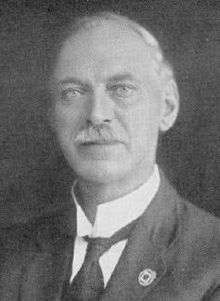Herbert Payne
| Herbert Payne | |
|---|---|
 | |
| Senator for Tasmania | |
|
In office 1 July 1920 – 30 June 1938 | |
| Personal details | |
| Born |
17 August 1866 Hobart, Tasmania |
| Died | 26 February 1944 (aged 77) |
| Political party |
Nationalist (1920–31) UAP (1931–38) |
Herbert James Mockford Payne (17 August 1866 – 26 February 1944) was an Australian politician. Born in Hobart, Tasmania, he was educated at state schools before becoming an investor and grazier. In 1903, he was elected to the Tasmanian House of Assembly for Burnie, transferring to Darwin in 1909. He was Treasurer, Minister for Agriculture and Minister for Railways 1912-1914. In 1919, he left the Assembly and was elected to the Australian Senate as a Nationalist Senator for Tasmania. In 1931, together with the rest of his party, he joined the United Australia Party. He held his seat until his defeat in 1937. Payne died in 1944.[1]
Compulsory voting
Payne's lasting legacy to the Australian political system was his Private Senator's Bill proposing the introduction of compulsory voting at Commonwealth elections. He felt some action was required following the record low voter turnout (59.38%) at the 1922 federal election. However, neither the government nor the opposition had compulsory voting on their platforms. Senator Payne introduced the Commonwealth Electoral Bill 1924 on 16 July 1924, and it was passed with little debate. The House of Representatives agreed to it in less than an hour, and in neither house was a division required, hence no votes were recorded against the bill.[2] It received Royal Assent on 31 July 1924.[3]
References
- ↑ Carr, Adam (2008). "Australian Election Archive". Psephos, Adam Carr's Election Archive. Archived from the original on 20 July 2007. Retrieved 23 November 2008.
- ↑ Chris Publick, The Case for Compulsory Voting
- ↑ Odgers, Australian Senate Practice Archived 31 December 2004 at the Wayback Machine.